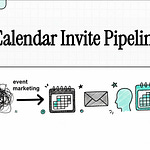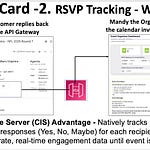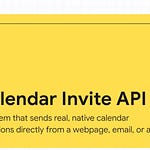Briefing Document: MailChimp RSVP Button - Update 3 Demo (Bears vs. Lions)
This briefing details the functionality and workflow of the Calendar Snack service, specifically demonstrating its integration with Mailchimp for event updates and RSVP management. The primary focus is on how event organizers can modify event details and ensure those updates are propagated to attendees who have previously responded to the invitation.
Key Themes and Concepts:
Organizer-Initiated Event Updates: The system allows an event organizer (Mandy) to make changes to an event (e.g., date, time, location) within her Google Calendar.
Calendar Snack as an API-Driven Service: Calendar Snack acts as an intermediary, processing these updates via APIs and pushing them to relevant platforms, specifically Mailchimp in this demo.
Automated Update Delivery to Attendees: Attendees who have previously received and responded to a Calendar Snack-powered Mailchimp invitation automatically receive updated calendar invitations with the latest event details.
RSVP Persistence and Reconfirmation: The system tracks attendee RSVPs. When an update is sent, attendees can reconfirm their attendance with the new details.
Mailchimp Integration: Calendar Snack seamlessly integrates with Mailchimp, allowing organizers to embed RSVP buttons directly into Mailchimp campaigns.
Most Important Ideas/Facts:
Workflow for Initial Invitation and RSVP:
An organizer (Mandy) creates an event (Lions vs. Bears) and sends the event data to countersnack.com.
This data is processed via APIs, with the Calendar Snack engine interacting with the AWS Countervite server.
An RSVP button is then inserted into a Mailchimp campaign.
A downstream actor (Zach) receives the Mailchimp campaign, clicks the RSVP button, and receives the original calendar invitation.
Zach responds to the invitation (e.g., "Yes, I'm going").
Demonstrated Update Scenarios:
Update 1: Booth Change (Location/Identifier)
Mandy, as the organizer, changes the "booth" from 983 to 1000.
This update is resent to calendarnack.com for processing.
The update appears in Mandy's Calendar Snack console.
"Any Mailchimp customer who has responded yes or no to the previous calendar received will receive an updated calendar with the changes in it."
Zach at techvador.com receives "the updated calendar invite with the changes," specifically "the booth 1000."
Zach confirms: "Yes, I'm still going."
Update 2: Time Change
Mandy changes the game start time from 11:00 to 11:15.
"You saw that I actually committed the change. It moved from 11:00 to 11:15."
The Calendar Snack engine processes this change.
"Zach received the updated invitation for the Lions versus the Bears."
Zach sees the "11:15 start" and is expected to say "yes."
Core Technology and Pipeline:
Organizer's Tool: Google Calendar client for Mandy.
Processing Engine: calendarsnack.com (Calendar Snack engine).
Server Infrastructure: AWS Countervite server.
Communication: APIs facilitate data transfer between components.
Notification Platform: Mailchimp.
Recipient's Action: Clicking the RSVP button in Mailchimp generates the original calendar invitation.
Update Mechanism: "The calendar snack service that services update APIs for the Mailchimp buttons."
Tracking and Confirmation:
The system gathers "data back here in the response engine for the calendar receipts from Zach's um calendar invite that is on his calendar." This indicates a feedback loop for tracking attendee responses to both initial invites and updates.
The update counter progresses, e.g., "We request that the update counter progress to three," indicating the number of updates sent for a particular event.
User Roles:
Mandy: The "organizer" and "current actor" who manages the event and makes changes. "Mandy is the organizer for the calendar snack."
Zach: An "actor downstream" and an "actor in the Mailchimp list" who receives invitations and updates.
In essence, the demo showcases a robust system where event organizers can dynamically manage event details, and the Calendar Snack service ensures these changes are automatically and efficiently communicated to all relevant attendees via Mailchimp, maintaining RSVP status throughout the process.











